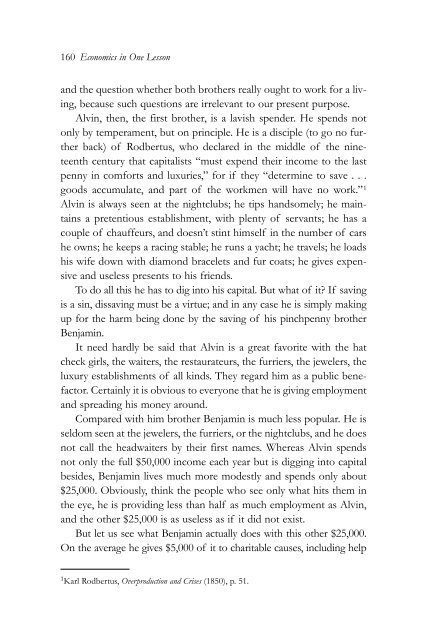1gDdM7w
1gDdM7w
1gDdM7w
- No tags were found...
Create successful ePaper yourself
Turn your PDF publications into a flip-book with our unique Google optimized e-Paper software.
160 Economics in One Lessonand the question whether both brothers really ought to work for a living,because such questions are irrelevant to our present purpose.Alvin, then, the first brother, is a lavish spender. He spends notonly by temperament, but on principle. He is a disciple (to go no furtherback) of Rodbertus, who declared in the middle of the nineteenthcentury that capitalists “must expend their income to the lastpenny in comforts and luxuries,” for if they “determine to save . . .goods accumulate, and part of the workmen will have no work.” 1Alvin is always seen at the nightclubs; he tips handsomely; he maintainsa pretentious establishment, with plenty of servants; he has acouple of chauffeurs, and doesn’t stint himself in the number of carshe owns; he keeps a racing stable; he runs a yacht; he travels; he loadshis wife down with diamond bracelets and fur coats; he gives expensiveand useless presents to his friends.To do all this he has to dig into his capital. But what of it? If savingis a sin, dissaving must be a virtue; and in any case he is simply makingup for the harm being done by the saving of his pinchpenny brotherBenjamin.It need hardly be said that Alvin is a great favorite with the hatcheck girls, the waiters, the restaurateurs, the furriers, the jewelers, theluxury establishments of all kinds. They regard him as a public benefactor.Certainly it is obvious to everyone that he is giving employmentand spreading his money around.Compared with him brother Benjamin is much less popular. He isseldom seen at the jewelers, the furriers, or the nightclubs, and he doesnot call the headwaiters by their first names. Whereas Alvin spendsnot only the full $50,000 income each year but is digging into capitalbesides, Benjamin lives much more modestly and spends only about$25,000. Obviously, think the people who see only what hits them inthe eye, he is providing less than half as much employment as Alvin,and the other $25,000 is as useless as if it did not exist.But let us see what Benjamin actually does with this other $25,000.On the average he gives $5,000 of it to charitable causes, including help1 Karl Rodbertus, Overproduction and Crises (1850), p. 51.


